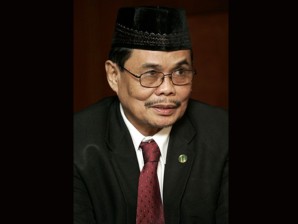Sabah events have no effect on Mindanao peace talks – MILF
OZAMIZ CITY, Philippines—The chief peace negotiator of the Moro Islamic Liberation Front said Tuesday that the standoff in Sabah between Malaysian security forces and elements of the so-called ‘royal army’ of the Sulu sultanate has “substantially no effect” on its negotiations with the government which is about to wrap up within the next two months.
Mohagher Iqbal gave this assurance to the Philippine Daily Inquirer in a phone interview Tuesday amid reports from Sabah about an ongoing crackdown launched by Malaysian authorities against a group of armed Tausug followers of the sultanate who sailed to Sabah on February and occupied a coastal village.
Malaysia has been facilitating the peace negotiations since 2003. Even as the standoff was going on, the 36th exploratory meeting of the peace panels from Feb. 25 to 28 went on smoothly in Kuala Lumpur.
But Iqbal said he was concerned about the “side effects” of the incident on the transition from the current Autonomous Region in Muslim Mindanao to the Bangsamoro setup that is currently being negotiated.
“It would not be truthful on our part if we don’t admit that there will be side effects,” Iqbal said. He declined to go into specifics.
Article continues after this advertisement“This is why I have proposed to the MILF central committee to draw up a statement on this regard. This is a very sensitive issue that needs to be addressed carefully,” Iqbal added.
Article continues after this advertisementA source told the Inquirer that however the standoff develops in the near term, there will be a need to manage local expectations about how a future Bangsamoro self-governance entity regards the issue of Sabah and the supposed vested rights of the sultanate.
“This can temper the efforts to consolidate the local constituency behind a new political arrangement in some areas of the Bangsamoro,” added the source, an academic who is familiar with Moro politics and society.
“In a way, it boils down to the question of who between the factionalized Sulu royalty and the MILF enjoys solid political legitimacy,” the source explained.
During the meeting of the peace panels in Kuala Lumpur last week, Iqbal stressed the need to “outpace potential spoilers” so that “the critical mass in support of the Framework Agreement on the Bangsamoro (is) secured.”
“The sour-graping of the so-called heirs of the Sultanate of Sulu that they were not consulted in the ongoing peace talks is a kind of spoilage. They were consulted on many occasions,” Iqbal pointed out.
“But the big question is: Why make this noise only now when for more than 40 years of conflict in Mindanao they have been silent?” he said.
“This brings out into the fore a pertinent observation: Is it not obvious that in the current controversy, the heirs of the Sultanate of Sulu have focused on their personal interest alone that precludes the interest and welfare of the entire Bangsamoro people?” Iqbal added.
The MILF had earlier said that although the struggle for the Moro people’s right to self-determination was founded on a glorious history that prominently featured the political might and influence of the sultanates of Sulu and Maguindanao, the Moro revolution had no aim of reviving these institutions as the mechanism for governing the Bangsamoro.
Based on his earlier statements, Sultan Jamalul Kiram III, one of the competing claimants to the throne of the sultanate, said they wanted a treatment of the sultanate and its claim to Sabah included in the future Bangsamoro arrangement.
Iqbal disclosed that the Kirams have not directly communicated with the MILF regarding their own aspirations.
“We are open to discuss matters with everybody except the terrorists. And that policy stands up to now,” he said.
